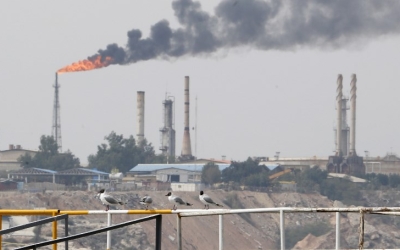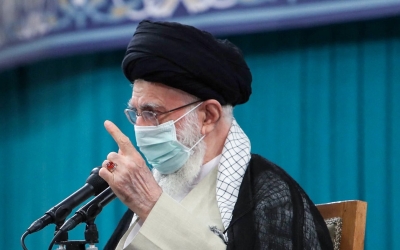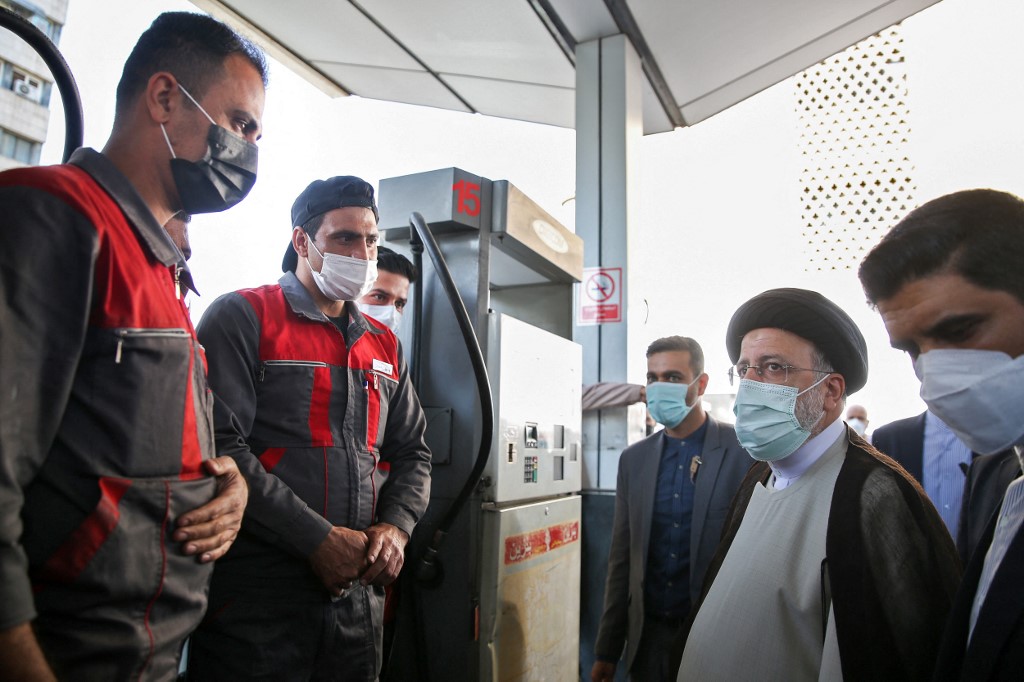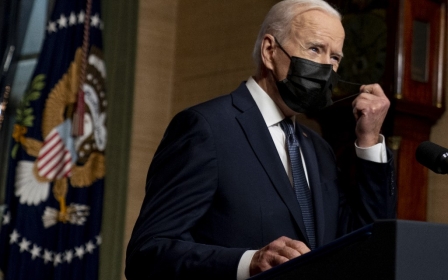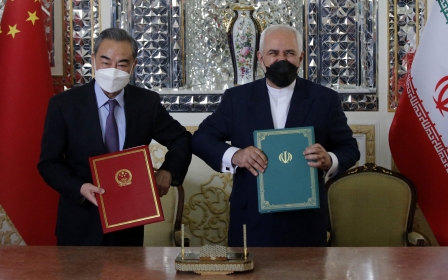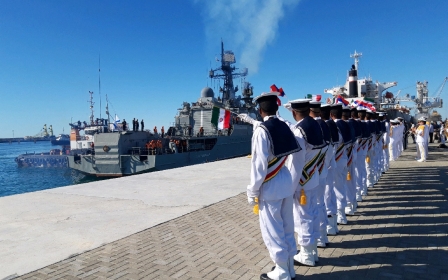Iran: Russia and China will not become Tehran's economic saviours any time soon
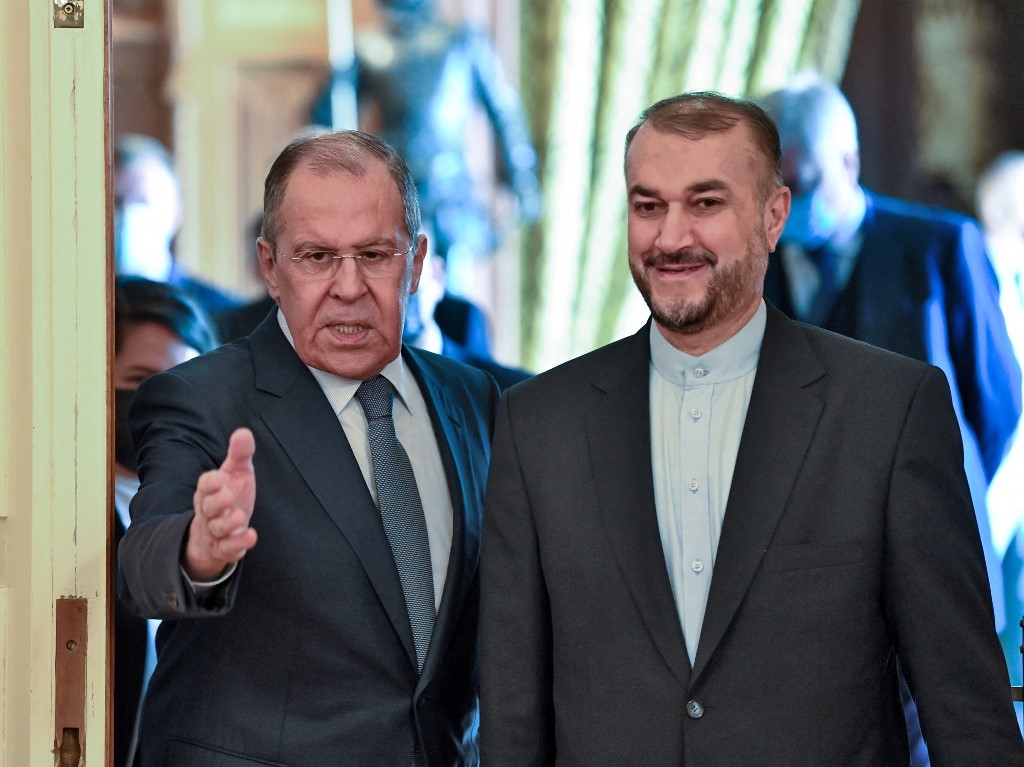
During four decades of antagonism with the United States and Europe, Iran has frequently used China and Russia as leverage to counterbalance western economic pressures.
And Beijing and Moscow have consistently provided Tehran with diplomatic and economic support. Under crippling US sanctions, Beijing imports Iranian oil and continues the lifeline trade with Iran and, along with Russia, backs the restoration of the Joint Comprehensive Plan of Action (JCPOA) nuclear deal and the removal of sanctions.
There are profound and long-standing domestic shortcomings on the Iranian side that make the mutual partnerships problematic
China also signed a 25-year strategic comprehensive deal with Iran, which entails the sustainable export of Iranian oil to China and billions of dollars' worth of Chinese investment in Iran in various areas.
Despite high-level diplomatic visits and exchanges and the signing of several agreements and treaties with Russia and China, however, Tehran has failed to develop a game-changing economic relationship with Beijing and Moscow.
Though the conservative government under President Ebrahim Raisi hopes to achieve new levels of bilateral and multilateral ties with China and Russia, there are profound and long-standing domestic shortcomings on the Iranian side that make the mutual partnerships problematic.
Binary governance
Since the Islamic revolution in 1979, Iran has increasingly witnessed the evolution of binary governance between elected governments on one side and the political system (Nezam) on the other.
Nezam has a set of goals and agendas which sometimes don’t correspond with those of the government. Moreover, governments are permanently affiliated with one of the two major political factions in Iran (conservatives and moderates) with divergent ideas and views on foreign policy and economic development.
Each new president tries to sideline his predecessor’s performance and plans and establish new patterns and procedures in the required fields, including foreign trade and external relations. Furthermore, Iran’s supreme leader repeatedly reasserts the policies of making a “resistance economy” and promotes the self-sufficiency principle, which puts limitations on governments regardless of their political affiliations.
These cracks have led to heterogeneous, incoherent, unsteady and short-lived policies and regulations that could discourage Russia and China from long-term engagement in Iran’s economy.
Iran’s inherently contentious relations and rivalry for regional hegemony with players such as Saudi Arabia and Israel always keep alive the possibility of an all-out conflict between Iran and Israel, or others.
Regional enmity
Israel has embarked on a “covert war” against Iran and threatens to turn it into overt military action. As long as Iran continues its regional agenda in Syria, Iraq and Lebanon, this enmity with regional rivals could create a strong sense of insecurity for potential Russian and Chinese investments and long-term economic engagement with the Islamic republic.
The proposed diplomatic initiatives by Russia and China for collective management of regional peace and security in the Middle East received little attention, and Tehran prefers to treat the region according to its principles.
Overall, the Iranian public and businesses have a western-oriented mindset and see China and Russia as “underdeveloped” nations that have neither good faith in doing bilateral business nor unique capabilities to share with Iran.
Many Iranian small and medium enterprises have been bankrupted over the years due to the massive importation of inexpensive and low-quality Chinese goods. The government failed to support these domestic entrepreneurs, because of the limited financial sources under sanctions and prioritising political considerations in controlling imports from China.
Some members of Iran's political class (and Iran observers) believe that Russia is the main obstacle preventing Iran’s energy exports to regional and global markets, and the major reason the Islamic republic cannot capitalise on the economic benefits from its regional influence, for example in Syria or the Caspian Sea.
Unlike China, which has about $19bn worth of trade with Iran annually, Russia-Iran trade barely reaches $3bn. Except for engaging in specific infrastructure projects, Russia refrains from further economic partnerships or greater levels of people-to-people business.
Unstable positions
Years of sanctions and economic isolation have prevented Iran from developing a comprehensive strategy for its foreign relations based on full national capacities and resources. Tehran consumes most of its time and energy on surviving the sanctions and sees Russia and China as invaluable economic partners in line with this goal.
Were sanctions lifted, it would give back to Iran the chance to leverage some of its unique geopolitical and geoeconomic advantages - such as untapped energy resources - and to appear as a hugely attractive market for western investors and industries.
As a long-standing contour of Iran’s foreign-policy thinking, the idea of opportunistically playing the East and the West off against each other survives. Further, Russia and China don’t have strategically defined positions within Iran’s foreign-policy thinking. It is unknown how Tehran will see Moscow and Beijing in the post-sanctions era. Russia and China, for their part, remain sceptical and don’t seem as enthusiastic as the new Iranian government to cultivate deeper economic ties.
From Tehran’s point of view, Iran should diversify its foreign relations with China and Russia (and other non-western countries) to diminish the harmful and destructive consequences of the sanctions on its economy. Meanwhile, Tehran expects to join Russia and China to form a new club of “sanctioned countries” against western “economic warfare”.
As two great nuclear powers, Russia and China see global cooperation and competition with the West as a priority
Due to China's high trade volumes with the US and the EU, and the Russian energy markets in Europe, Beijing and Moscow have always complied with US sanctions against Iran and have had little room to manoeuvre in favour of Tehran. As two great nuclear powers, Russia and China see global cooperation and competition with the West as a priority and don’t want to incur the high costs that might result from supporting Iran’s ambitions.
While Iran’s economy increasingly deteriorates under sanctions and the country’s strategic industries and infrastructure need colossal investment and overhauls, the Raisi government hasn’t yet disclosed any strategic plan for productive foreign economic engagement.
Paradoxical situation
Unlike encouragements by Russia and China to come back to the restoration procedure of the JCPOA in Vienna as a possible “legal” way of lifting the sanctions, Tehran doesn’t see it as an urgent issue and is trying to make ceremonial changes rather than facing realities.
The Raisi government prefers mostly to look different from its predecessor on the nuclear dossier and the JCPOA restoration talks. Nevertheless, whether Moscow and Beijing truly support a great settlement between Tehran and Washington or not, the Islamic republic would be wise to pursue a constructive policy with the nuclear issue to avoid alienating Russia and China.
However, they are in a paradoxical situation with Iran regarding sanctions and economic engagement. They see the sanctions and Iran’s other multiple domestic constraints as obstacles that don’t allow higher levels of economic cooperation on the one hand, and expect to have a considerable share of Iran's untapped markets in any post-sanctions era on the other.
As much as Tehran needs to leverage against the West to force maximum concessions in future negotiations, Russia and China are not ready to meet Iran’s sizeable economic expectations.
In a nutshell, Tehran’s economic relations with Beijing and Moscow through covert transactions and transportations cover only a part of its daily necessities and cannot persist indefinitely.
China and Russia will remain reluctant partners, incapable of carrying out the nearly impossible mission of transforming Iran’s dire economic situation, unless Tehran removes internal and international obstacles, and reaches an enduring settlement with the US and its regional allies.
The views expressed in this article belong to the author and do not necessarily reflect the editorial policy of Middle East Eye.
Middle East Eye propose une couverture et une analyse indépendantes et incomparables du Moyen-Orient, de l’Afrique du Nord et d’autres régions du monde. Pour en savoir plus sur la reprise de ce contenu et les frais qui s’appliquent, veuillez remplir ce formulaire [en anglais]. Pour en savoir plus sur MEE, cliquez ici [en anglais].



